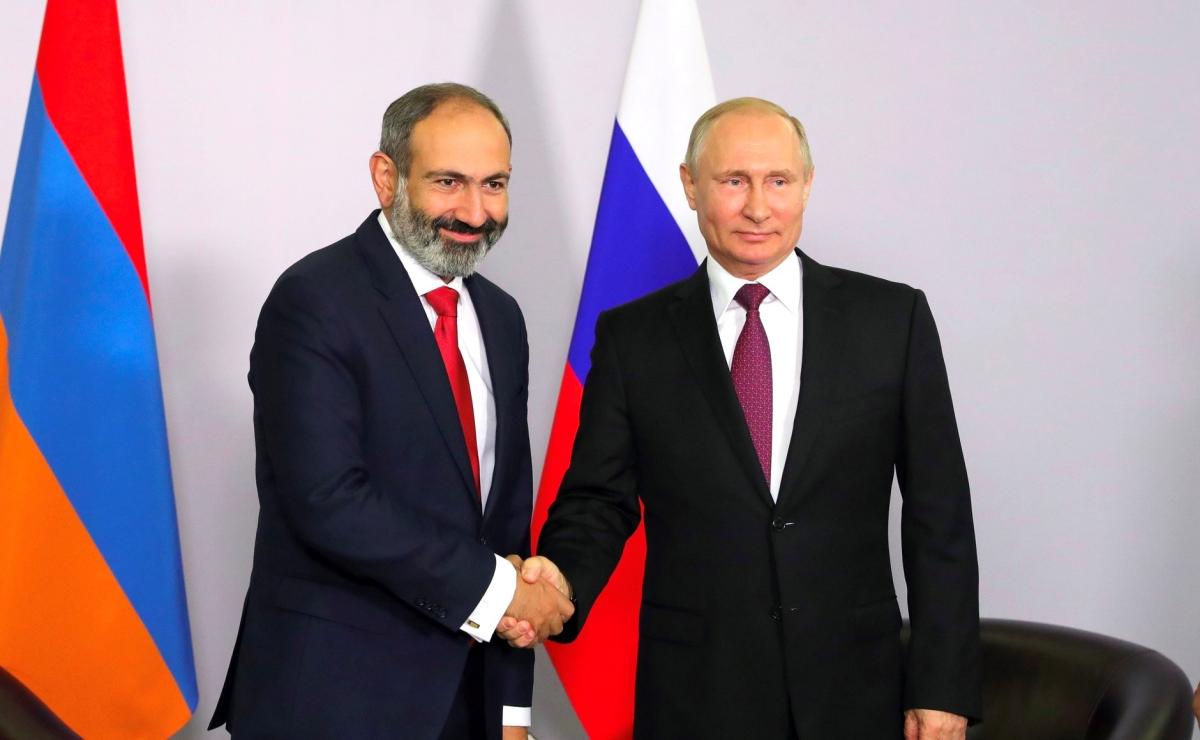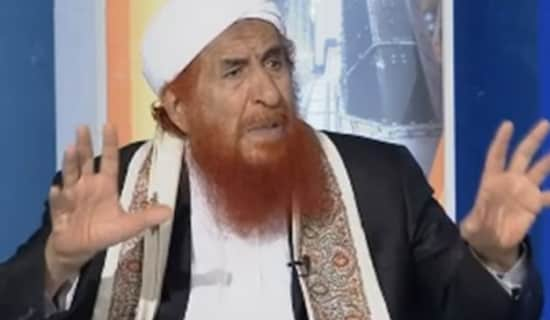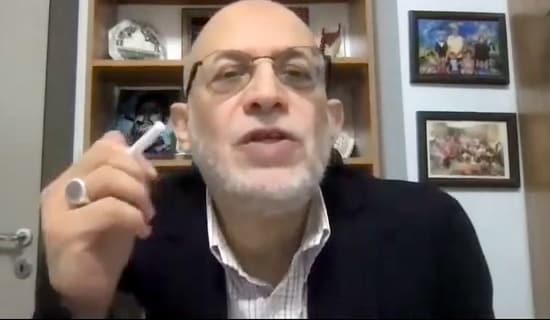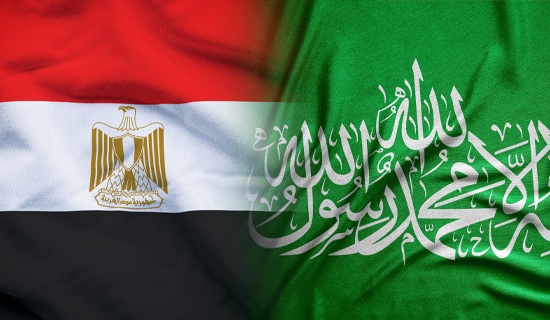Last week the Azerbaijani army conducted its own "special military operation" aimed at squeezing out Armenian forces from the self-proclaimed Nagorno-Karabakh Republic. Baku is trying to strengthen its grip over the part of the territory under Armenian control, facing little or no response from the Russian peacekeepers dispatched to the region in 2020.

Armenian Prime Minister Nikol Pashinyan and Russian President Vladimir Putin.
On September 19, 2023, the Azeri command informed the Russians about its military plans, as Moscow stated, "just minutes before the operation had started,"[1] but Moscow did not share this news with Armenia.[2] In fact, Russia seems not only to have no intention of being involved in the fighting, but does not even have any legal ground for getting involved, since most of the agreements regulating their presence in the region have not been signed by Azerbaijan.[3] Hence, Moscow cannot engage with Baku regular forces even if it wanted to.
Russia and the Moscow-led Collective Security Treaty Organization (CSTO) ignored the Azeri assaults on Armenia's territory and remained nonresponsive, as Yerevan directly asked the CSTO for military assistance as a party of the treaty.[4] In recent months, the Russian forces did nothing to end the Azeri blockade of the "Lachin corridor,"[5] the only road Armenia can use to supply the Nagorno-Karabakh enclave. Yet, as Armenia made its first attempts to rejuvenate its ties with the West – it started the ratification of the ICC statute,[6] engaged in military drills with the U.S.,[7] and sent its First Lady to Kyiv for a meeting hosted by President Zelensky's wife,[8] – the Kremlin complained about all these moves. In fact, despite the recent arrest warrants that the ICC issued for Russian President Vladimir Putin, Armenia's move to join the ICC seems to be the only way to persecute Azerbaijan for war crimes. Further, Armenia's Western-leaning policies seem to be the only response that the tiny republic could make in response to the lack of support from Russia. In 2021, the European Union resumed its talks with Armenia, which ended in 2013 when Yerevan decided to join the Eurasian Economic Union, which provided Armenia with €2.6 billion in aid and loans from Moscow.[9]
Armenia And Azerbaijan After The Soviet Collapse
Looking back at the history of the relationship between Russia and Armenia and trying to learn some lessons from the Nagorno-Karabakh crisis, it must be noticed that the current state of affairs should be no surprise. When in the 1990s, the war between Armenia and Azerbaijan became one of the bloodiest conflicts in the post-Soviet realm, Russia did its best to foster policies later termed "managed instability doctrine."[10] Moscow tried to position itself as an indispensable ally to both sides of the conflict; supplied armaments and ammunition to both parties, and tried to broker an armistice and a peace accord after hostilities began to calm down.
In 1994, Russia strongly supported the so-called Minsk process to promote an armistice. Since then, negotiations formally continued without producing any comprehensive peace treaty.[11] The Kremlin wanted to remain in control of the process, but seemingly was not interested in a clear-cut final resolution. Therefore, while Yerevan sided with Moscow, Baku made an alliance with Ankara that wished to bring the Nagorno-Karabakh area under Azerbaijani control.
It should be observed that since Armenia and Azerbaijan gained their independence after the Soviet collapse, their paths were quite different. By the mid-1990s, Azerbaijan had overcome its political quarrels and turned into a largely authoritarian state with a kind of hereditary power system. The country, which is rich in natural resources, integrated quite successfully into the regional economy, and became not only an oil supplier to the neighboring nations but also an "energy corridor" bridging Central Asia with Turkey and Europe.
Between 1991 and 2020, Azerbaijan's GDP in current dollars at the market exchange rates rose by almost 15 times,[12] and its population shot up from around seven million to over ten million people. Though Azeris used to live all over the former Soviet Union, the emigration remained moderate from independent Azerbaijan into the Azerbaijani diaspora across the world, being composed primarily of people leaving Iran, where more than 30 million Azeris live.[13]
Armenia instead went through a "non-development" path. From 2005 to 2020, its GDP stagnated,[14] and consequently more than a million people left the country in search of decent employment, which raised the remittances' flow from abroad to over 10 percent of Armenia's GDP.[15]
Concerning defense, since 2004 the Azerbaijani military budget increased from around $400 million to more than $2.6 billion in 2022, while since 2000 Armenia's defense expenditures have been 10 times less than those of Azerbaijan.[16] Armenia has a Soviet-style military, being supplied with Russian weaponry that has proven to be extremely vulnerable when confronted by Western and Turkish equipment.[17] Possessing in 1991 a nominal GDP of a bit less than nine percent of those of Azerbaijan and Turkey combined, Armenia failed to manage its economy effectively. The leaders in Yerevan lacked realistic ideas for their country, pretending it might become either a "bridge" between the West and the Eurasian Union or a cherished destination for overseas tourists.
Deep Concern Over The Resuming Hostilities
SUPPORT OUR WORK

The current crisis in Russia-Armenia relations developed because Russia never needed Armenia and never expected to sustain this non-developing nation. In 2014, as Moscow annexed Crimea and Putin prepared to establish a new integration project known as the Eurasian Economic Union, Russia suddenly "bought up" Armenia, offering around $400 million in loans and military assistance for an immediate application to join the Union. In 2015, Armenia became a member of the organization, and this was a symbolic victory for the Kremlin, since prior to this move Armenia conducted intensive negotiations with the European Union to sign an Association Agreement that included a Deep and Comprehensive Free Trade Area treaty. However, after joining the Eurasian Economic Union, the negotiations with the EU stopped.
Only after losing in the 2020 Second Karabakh war, Yerevan ratified the Armenia-EU Comprehensive and Enhanced Partnership Agreement, which took effect on March 1, 2021. While the West still tries to assist Armenia, Russia did almost nothing. In 2020, it took more than a month for Moscow to intervene diplomatically after the Azeri forces took over Shusha, the key town that opened their further advance to Nagorno-Karabakh capital, Stepanakert.
The global community – Russia included – expressed deep concern over the resuming hostilities, but no impressive results can be achieved. In fact, Azerbaijan is militarily strong, and the Kremlin is preoccupied with its war in Ukraine. Furthermore, Russia and the Western powers are looking for establishing closer ties with Turkey, thus making Ankara free to assist Baku in its efforts.
Conclusion
The development of the Karabakh conflict after 2020, as well as the 2022 Russian invasion of Ukraine, opened a completely new chapter in the history of the post-Soviet realm. For almost 30 years after the collapse of the Soviet Union, Russia has remained the only major actor in its former territory, except for the Baltic states, which rapidly joined the European Union.
It commanded security and economic alliances in Eurasia, managed to solve some armed conflicts on its own conditions (as in Tajikistan where the country remained united), intervened in sovereign territories (as in Georgia in 2008 or in Ukraine in 2014), and did all this with minor involvement of external forces, or completely without them. However, starting with the 2020 Second Nagorno-Karabakh War, the post-Soviet conflicts turned into internationalized ones: external actors started to train, equip, and support local military forces that challenged the order that Moscow wished either to install or preserve.
This looks like a serious change of agenda: the Kremlin has lost its monopoly on managing the post-Soviet states' affairs both in the West (as in Ukraine and Moldova) and in the South (with all Trans-Caucasian states becoming free from Russian influence to be safeguarded by Turkey and the European nations). Central Asia's drift away from Russia is also only a matter of time, but the developments there seem to me more complex as Russia, China, the West, Turkey, and even Gulf countries all possess their interests in the region. Yet, wherever these trends may evolve, one thing looms large: Russia is now losing its status as a leading regional power, which it may never regain.
*Dr. Vladislav Inozemtsev is the MEMRI Russian Media Studies Project Special Advisor, and Founder and Director of the Moscow-based Center for Post-Industrial Studies.
[1] Forbes.ru/society/496747-zaharova-zaavila-ob-uvedomlenii-ot-baku-ob-operacii-v-karabahe-za-minuty-do-ee-nacala, September 19, 2023.
[2] Rbc.ru/politics/19/09/2023/650983479a794792de8f0803, September 19, 2023.
[3] Meduza.io/feature/2023/09/20/azerbaydzhan-nachal-bolshuyu-voynu-s-armeniey-chto-budet-delat-zapad-na-chiey-storone-rossiya-i-vazhno-li-eto, September 20, 2023.
[4] Interfax.ru/world/862580, September 16, 2023.
[5] Rbc.ru/politics/27/12/2022/63ab057d9a794751b871740f, December 27, 2022.
[6] Interfax.ru/world/919478, September 6, 2023.
[7] Rbc.ru/rbcfreenews/64ff01dc9a7947770f587b41, September 11, 2023.
[8] Kommersant.ru/doc/6198616, September 6, 2023.
[9] Media.am/en/verified/2021/09/16/29555/, September 16, 2021.
[10] Globalaffairs.ru/articles/blizhnee-zarubezhe-vsyo-dalshe-ot-rossii/, November 18, 2004.
[11] Nkr.am/ru/osce-minsk-process
[12] Data.worldbank.org/indicator/NY.GDP.MKTP.CD?locations=AZ
[13] Azerbaijan.az/ru/related-information/207
[14] Data.worldbank.org/indicator/NY.GDP.MKTP.CD?locations=AM
[15] Theglobaleconomy.com/Armenia/remittances_percent_GDP/
[16] Fip.am/ru/19342
[17] Kavkaz-uzel.eu/articles/328706, December 4, 2018.




